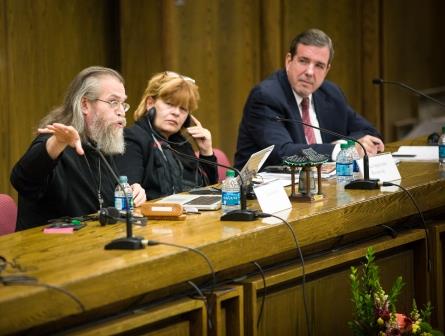Symposium 2013: Russia and Macedonia

Joseph Hepworth reporting
Moderator: Michael L. Jensen
Speakers:
Yakov Krotov and Zorica Angelovsska-Kovasevikj
Yakov Krotov, Priest, Ukrainian Autocephalous Orthodox Church Reunited, Russia
The lack of religious freedom is in the center of public discussion in Russia. Russia can be characterized as a state without law. If you are a member of the Russian ruling elite (about 25% of the population), you have the right to violate some of the laws, depending on your status. The Russian President can violate all laws. There is a gap between the philosophy of human rights and the philosophy of religion. Religious freedom is connected to the right of health. The right “to be” includes the right not to be, or the right to suicide.
Zorica Angelovsska-Kovasevikj, Sector Head for Relations with Religious Communities and Groups and Protocol, State Commission for Relations with Religious Communities and Groups, Macedonia
Macedonia is located in southern Europe. It is very multicultural with a broad range of cultures and peoples. Thirty churches have been recognized. Religion is a part of the daily life of the Macedonian people. A 2007 law on religion is considered to be the most liberal law in the region. It provides equal legal status to all religious groups. Religious groups are separate from the state and equal to each other. Everyone has the right to freedom of belief and thought, individually or jointly, in public or in private. Religious groups have the right to establish schools. Religious freedom is guaranteed in Macedonia. Religions are separate from the state and equal before the law. There is no state religion in Macedonia. The largest groups are the Macedonian Orthodox Church and Islam. The five traditional churches in Macedonia participate in an Interreligious Council. Property confiscated in the past has been returned to religious communities.